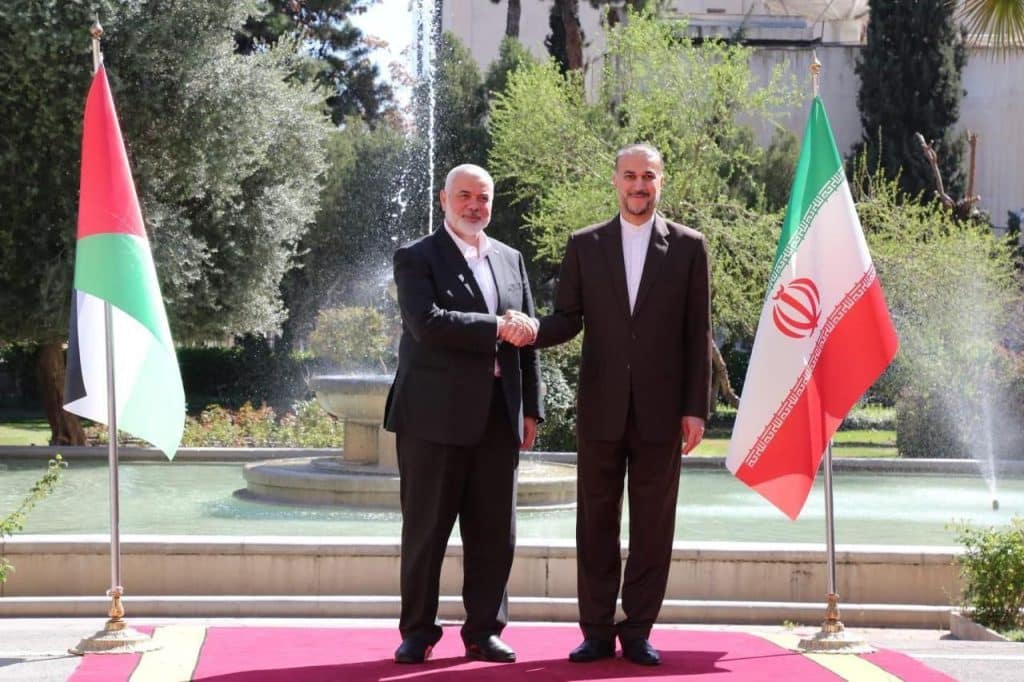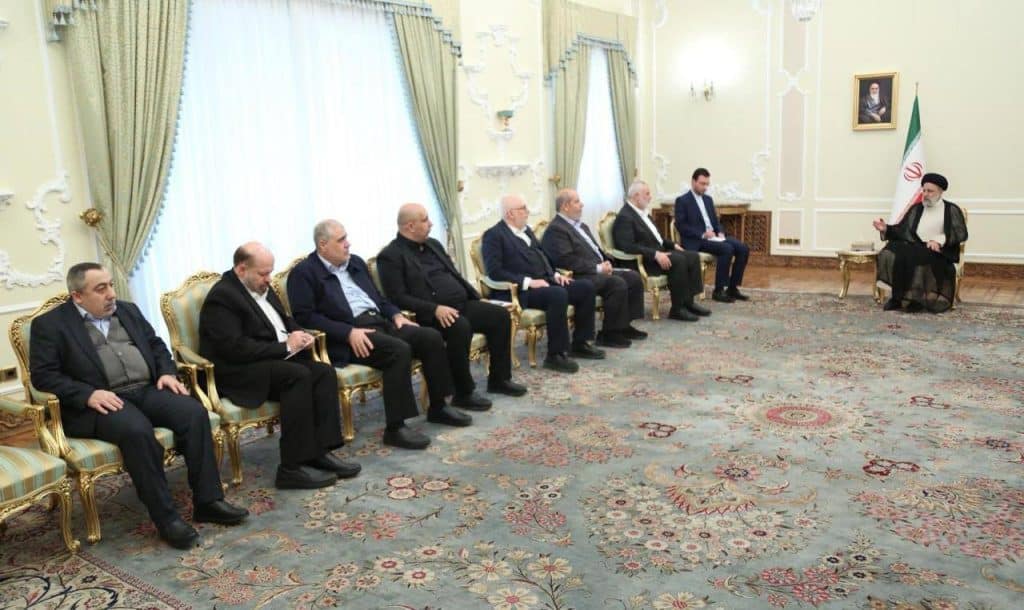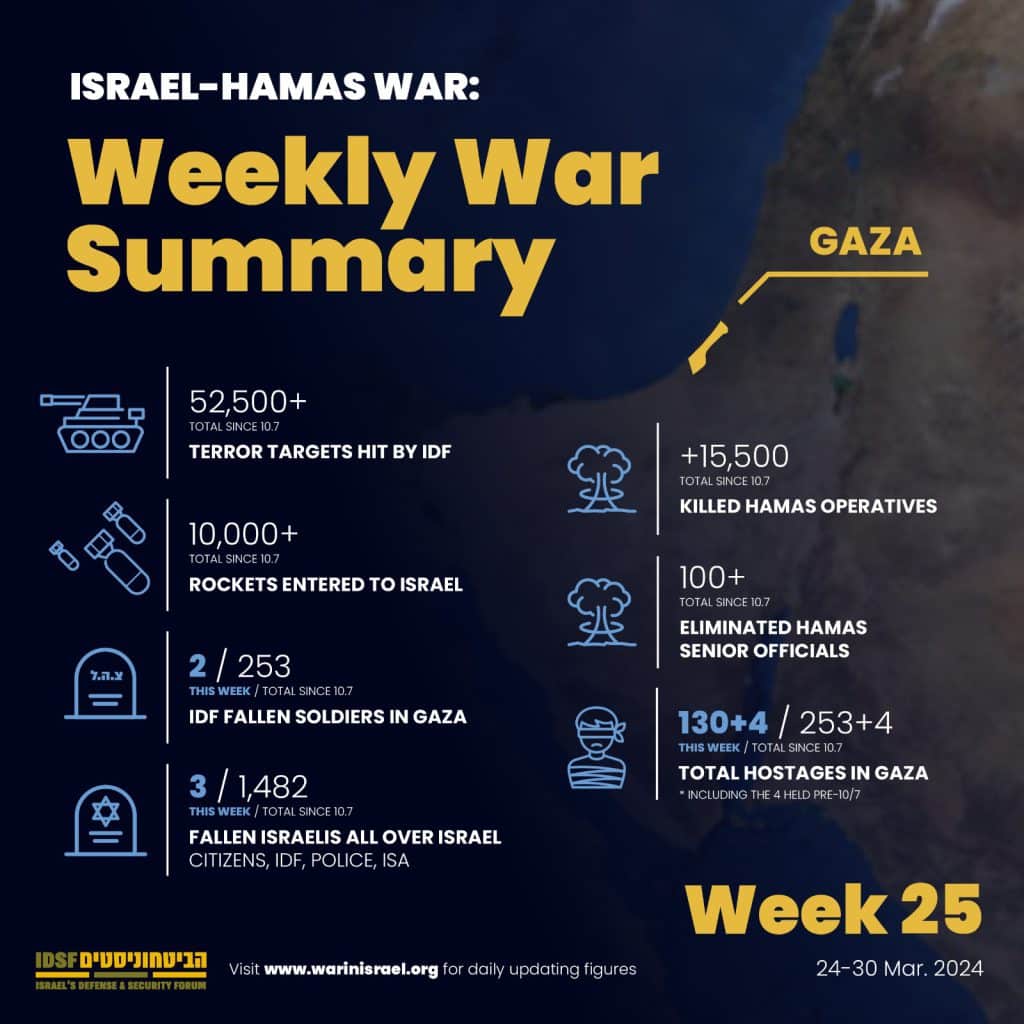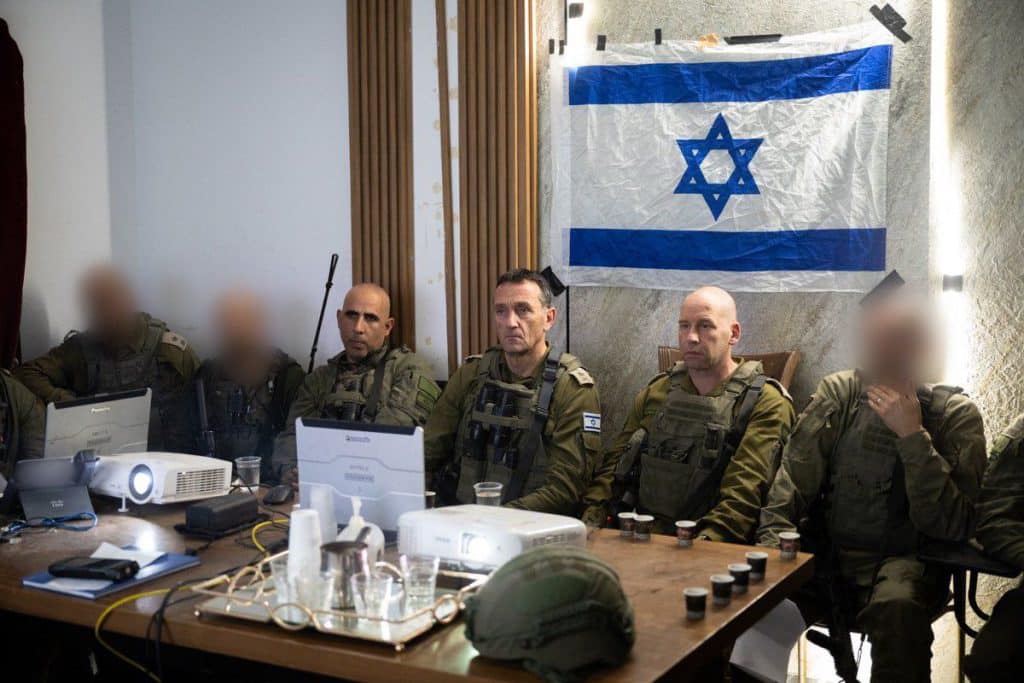
Overview
- Ismail Haniyeh, the head of Hamas’ political bureau, met in Tehran with senior Iranian leadership including military chief of staff, Mohammad Bagheri, Foreign Minister, Hossein Amir Abdollahian, President Ebrahim Raisi and Supreme Leader Ayatollah Ali Khamenei. Iran is known to have been the chief sponsor and supporter of Hamas, with at least $360 million USD of annual financial aid, provision of the bulk of its military equipment, alongside international political sponsorship and support.
- The US did not prevent the passage of a UN Security Council resolution which called for an immediate ceasefire without a direct linkage to the return of the Israeli hostages, after it had vetoed three previous cease-fire resolutions. This constitutes a clear diversion of the US consistent policy since the beginning of the war.
- Prime Minister Benjamin Netanyahu canceled a senior governmental delegation to Washington in response to the US abstention of the UN Security Council vote but will send anther delegation in the coming days.
- Despite the increased friction between the Israeli and American governments, the Biden administration approved a military package this week.
- The IDF is continuing its operation, clearing out the remaining terrorist strongholds in northern Gaza. One such region is the area surrounding the Al Shifa hospital, where more than 80 attacks have been launched since March 18th. The IDF have captured hundreds of Hamas terrorists, including senior officials, and have killed dozens, while avoiding casualties to patients or medical staff demonstrating remarkable execution by the IDF forces. So far over 900 terrorists were arrested with over 513 identified as Palestinian Islamic Jihad or Hamas terrorists, including senior ones.
- The International Court of Justice issued new provisional measures requiring Israel to increase the facilitation of basic humanitarian goods to the Gaza Strip.
- The New York Times published an illuminating article describing the sexual abuse Hamas inflicted upon released hostage Amit Soussana while she was in captivity.
- Israeli Defense Minister Yoav Gallant met with US Secretary of Defense Lloyd Austin and reportedly discussed the possibility of creating a multinational peacekeeping force, including Persian Gulf Nations, in Gaza after the war ends. The prospects of such a force still seem slim.
- IDF spokesperson Brigadier General Daniel Hagari confirmed the elimination of Marwan Issa, the deputy of Mohammad Deif.
- Israel’s Supreme Court issued an interim ruling that threatens the stability of Israel’s government which requires Haredi/Ultra-Orthodox men to draft into the IDF, or forfeit potential funds earmarked to their Yeshivas as the law exempting Haredi/Ultra-Orthodox from serving in the IDF expires on April 1st.
- Three U.N. military observers and a Lebanese translator were injured by a Hezbollah rocket as they were patrolling the border with Israel.
- Appointed by PA Chairman Mahmoud Abbas, new Palestinian Prime Minister, Mohammad Mustafa, has formed a new cabinet in which he will also serve as the Foreign Minister.
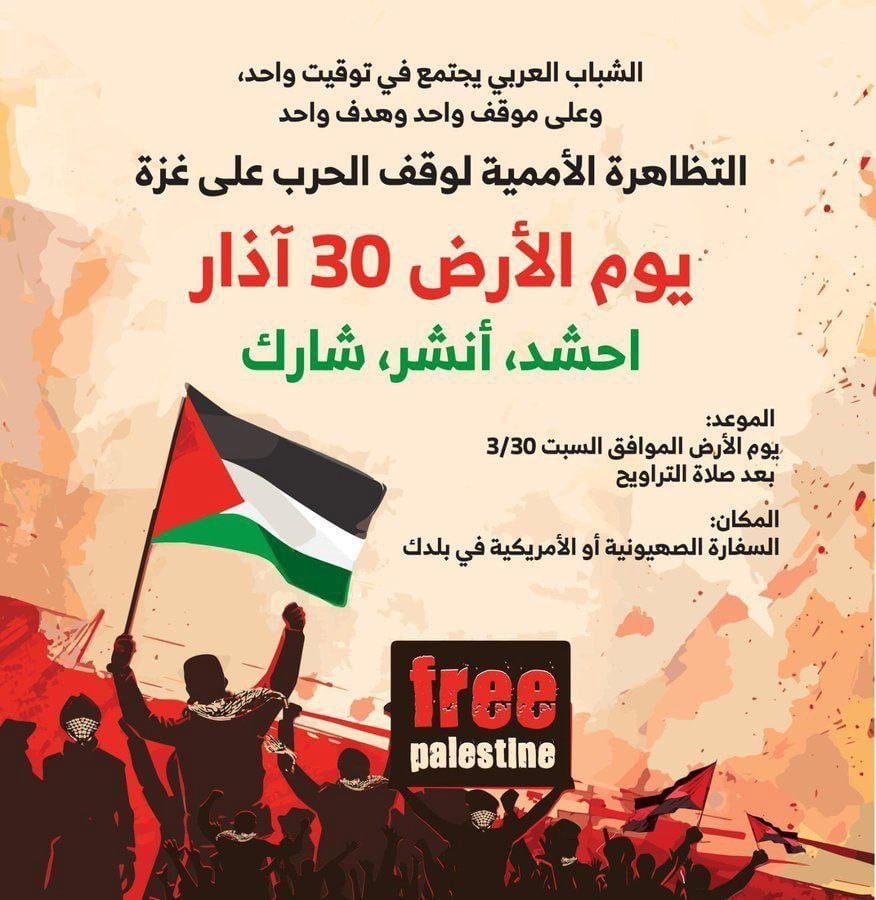
International
- Ireland plans to intervene in South Africa’s Genocide Case Against Israel at the ICJ. Micheál Martin, the Republic of Ireland’s Foreign Minister and Deputy Leader, said that officials were working on a “Declaration of Intervention” in the case that, which would be filed with the court, in The Hague, if approved by the Irish government.
- 130 members of the British Parliament signed a letter demanding a ban on the sale of ammunition to Israel, fearing non-compliance with the United Nations resolution for an immediate ceasefire in Gaza.
- The President of Colombia, Gustavo Petro, threatened that Bogota would sever its diplomatic relations with Israel if it does not comply with the UN Security Council’s resolution for an immediate ceasefire.
- The United States Department of the Treasury imposed sanctions on six entities that assisted in the shipment of goods and the execution of financial transactions for the Iranian Revolutionary Guards’ Quds Force, including the Houthis in Yemen and Hezbollah in Lebanon. It was also stated that the United States will continue to act to disrupt the misuse of international energy markets by hostile actors to support terrorist activities.
- Police in Jordan arrested dozens of protesters who tried to storm the Israeli Embassy compound in Amman. Officers repelled the crowd of more than 2,000 that gathered outside of the Embassy using batons.
Gaza Strip
Diplomatic
The US did not prevent the passage of a UN Security Council resolution which called for an immediate ceasefire, without a direct linkage to the return of Israeli hostages, after it had vetoed three previous cease-fire resolutions. While the resolution did mention the hostages, the resolution did not condition a ceasefire on the release of the hostages and created a parallel route for both goals for the first time. The US de facto changed its diplomatic policy towards the war despite the denials of various Biden administration officials. Hamas reacted very enthusiastically to the passage of the resolution.
As a result of the change of policy, Netanyahu canceled a delegation to Washington that was to include Netanyahu aides, War Cabinet Member Ron Dermer and National Security Advisor Tzachi Hanegbi. The US expressed its frustration by the cancellation of the delegation from what it perceived as an Israeli overreaction, an illustration of the strained Israel-US relations. After the initial cancellation the Biden administration announced that an Israeli delegation from the PM’s office would indeed visit DC soon, despite the Prime Minister’s office silence on the matter.
Despite, the increased friction between the Israeli and American governments, the Biden administration approved a military package this week which includes more than 1,800 MK84 2,000-pound bombs and 500 MK82 500-pound bombs. Last week, the State Department authorized the transfer of 25 F-35A fighter jets and engines worth roughly $2.5 billion.

ICJ and the humanitarian condition in Gaza
- The International Court of Justice issued new provisional measures requiring Israel to increase the facilitation of basic humanitarian goods to the Gaza Strip, including food, water, fuel and shelter, due to what it described as worsening living conditions for Palestinians in the war-torn territory. The Coordinator of Government Activities in the Territories (COGAT), the Israeli military body responsible for distributing aid criticized the decision as much of the aid is currently on the other side of the fence waiting for it to be distributed in a manner that would likely allow for Hamas to steal the aid. To get daily-updating stats on the humanitarian aid coming into Gaza alongside all war-related stats, consult org.
- This comes as COGAT released a report which challenges other reports that rely on Hamas provided information, that present a factually incorrect picture of a non-existent famine. Hamas, anti-Israel NGOs and other actors appear to have promoted these false allegations to delegitimize and accuse Israel of creating a famine as a sort of collective punishment. Concerns over famine stemmed from a report by Integrated Food Security Phase Classification, which claimed that there were 1.1 million people projected to experience “catastrophic hunger.” COGAT indicated that study made its conclusions based on false or incomplete information that can be attributed to the chaotic nature of the war and other estimates that came directly came from Hamas affiliated bodies which cannot be trusted.
- It is worth noting that Israel does not place any restriction on the flow of aid into Gaza and even provides water, which it does not have to according to International Law. The bottleneck exists in the distribution of aid that has already been vetted by Israel and is merely awaiting in Kerem Shalom to be distributed to Gaza civilians by aid agencies. Hamas uses its control over the aid and lack thereof to further its governance in the Gaza Strip by creating a reliance on it by the population. Separating Hamas from aid distribution is therefore critical for the well-being of Gazans.
US role in the war
- Chairman of the Joint Chiefs of Staff of the U.S. military, General Charles Brown, stated that Israel did not receive all the weapons it had requested, partly because the Biden administration refused to provide some of them. “We support their (the Israelis’) capabilities, but they didn’t get everything they asked for,” said Brown, “Part of it is because they asked for things that we either can’t provide or are not prepared to provide, not at this time.”
- The United States announced that it has imposed sanctions on several Palestinian online media bodies that are used for the distribution of propaganda and for the transferring of money to terrorist organizations in the Gaza Strip. One of the targets of the sanctions is the Arabic-language Telegram channel GAZA NOW, infamous for its propagating of uncensored graphic content related to Israeli victims.
- Former US President Donald Trump gave an interview to an Israeli newspaper, “Israel Hayom”, calling on Israel to finish the war quickly as it is losing international support. Trump also justified Israel’s response to the October 7th
Hamas’ war crimes and propaganda
- The New York Times published an illuminating article describing the sexual abuse Hamas inflicted upon released hostage Amit Soussana while she was in Hamas captivity. This is the first public account of the sexual violence Hamas perpetrated against Israeli hostages in a mainstream media outlet.
- The Shin Bet and the IDF released a video of an interrogation of a PIJ terrorist who participated in the October 7th attack and confessed to raping an Israeli woman.
- Hamas and Al Jazeera through various propaganda channels claimed that IDF troops sexually assaulted Palestinian women in Al Shifa. This story was later exposed as being fabricated and even Al Jazeera backtracked the story as it claimed the material was not “substantiated”.
The Day After in Gaza
- Israeli Defense Minister Yoav Gallant met with US Secretary of Defense Lloyd Austin and reportedly discussed the possibility of creating a multinational peacekeeping force in Gaza after the war ends. This force would include 3 unnamed Persian Gulf nations (not including Qatar and Saudi Arabia) which would be charged with securing Gaza and would be responsible for delivering humanitarian aid to the population. The US supports the plan given the implementation of Gallant’s plan for “the day after” presented 3 months ago which would include a Palestinian civil administration by actors not affiliated by Hamas and a global task force.
- Gallant also discussed with Austin the American preference to a ground maneuver in Rafah. The administration prefers an orderly evacuation of the civilian population and specific focused raids that would target Hamas leaders in the region.
- Reportedly, the PA has agreed to a series of reforms in accordance to US demands and stop its “Pay for Slay” program. The “Pay for Slay” program which institutionalizes payments to imprisoned terrorists and their families as a reward for their terrorism, is a consensus in Palestinian society with some polls indicating support of up to 90% for the policy. The proposed reforms are going to change the rates paid to families of the terrorists from criteria which currently includes the number of victims that were murdered or injured by the terrorist to the welfare needs of the families. In fact, it is merely a change of optics as the policy still remains.
- Reforming this ‘welfare policy’ is designed to bring the PA into compliance with the 2018 congressional legislation known as the Taylor Force Act, which suspended US aid to the PA as long as it continued granting prisoners stipends based on time served.
- The PA pays about 7% of its annual budget or about 20% of its international assistance funds to this policy anchored in law that incentivizes terrorism.
- Israel officially announced that it will cease working with UNRWA, the UN Relief and Works Agency for Palestinian Refugees, claiming that the organization contributes to perpetuating the conflict. A government spokesperson stated, “UNRWA is part of the problem, and we are now stopping our work with the agency.”
The Hamas Hostage Deal
A change in the position of Likud ministers regarding the hostage deal was recorded yesterday in the extended cabinet meeting, with all ministers except Defense Minister Galant and Prime Minister Netanyahu expressing support for flexibility towards Hamas. During the meeting, Mossad Chief David Barnea said that “the conditions for a deal have matured. The return of the residents to the north is a game-changer.” Subsequently, Transportation Minister Regev expressed support for the deal, stating: “Every effort must be made to bring back the hostages, even at the cost of delaying residents to return north.”
A delegation is planned to arrive this week in Cairo and Doha for another round of negotiations while there are still Israeli officials in Doha from the previous round of talks.
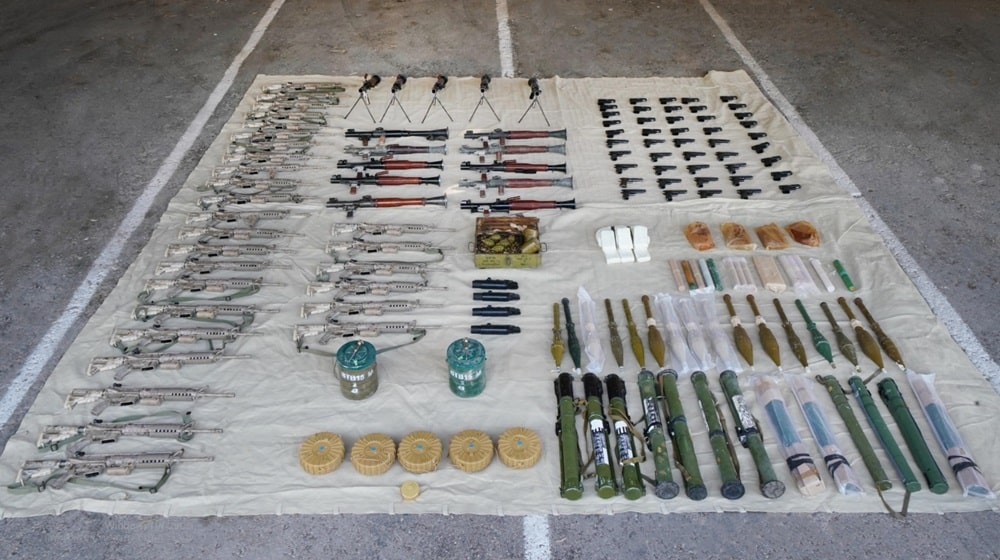
Operational
- The IDF destroyed a 2.5 km long tunnel connecting northern Gaza to the refugee camps in central Gaza.
- IDF spokesperson Brigadier General Daniel Hagari confirmed the elimination of Marwan Issa, the deputy of Mohammad Deif. Issa was killed in an airstrike operation in the center of the Gaza Strip, but until the IDF spokesperson’s announcement, no official confirmation of his identity was given. Hagari also revealed that Razee Abu Tamea, the head of the combat and administrative assistance staff in Hamas, was killed in the attack.
Satellite images show that the IDF is demolishing buildings and structures that are within one kilometer from the border fence along the Gaza Strip, to create a perimeter to prevent future attacks. This also includes the construction of a corridor near the Israeli town of Be’eri that measures approximately 7 kilometers long and about 350 meters wide, which will also require the evacuation of about 350 buildings and structures.
These actions will reduce the area of Gaza by about 16% and is deemed necessary for the security of the State of Israel. The IDF has also incorporated the area in which it would secure its troops in place for the pier that the US military is planning to have built and ready for use in early May. The IDF is preparing to secure the area near the pier which is being built to the north of the security corridor. Securing the pier area which would most likely be attacked by terrorists would encumber the IDF as it would have to deploy its forces near large vulnerable populations centers in Zaitun and the area South of Gaza which would leave troops in the open for surprise attacks.
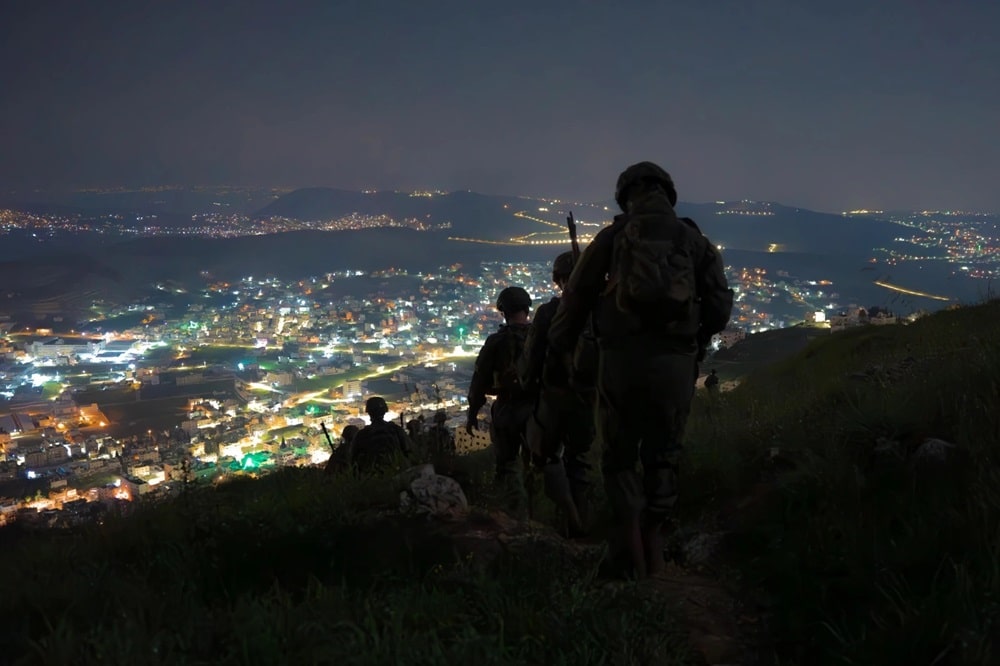
Al Shifa
The IDF is continuing its operation, clearing out the remaining terrorist strongholds in northern Gaza. One such region is the area surrounding the Al Shifa hospital where more than 80 attacks have been launched since March 18th.
The IDF have captured hundreds of Hamas terrorists, including senior officials, and have killed dozens, while avoiding casualties to patients or medical staff demonstrating remarkable execution by the IDF forces. An example of a senior Hamas commander who was sheltering in Al Shifa includes the Head of Manpower in Hamas’ Military Wing, Ra’ad Thabat one of the 10 most senior Hamas officials. The apprehended terrorists provided valuable information regarding the location of long-range rockets in the hospital premises. So far over 900 terrorists were arrested with over 513 identified as Palestinian Islamic Jihad or Hamas terrorists, including senior ones.
Other
- The PIJ launched rockets towards Ashkelon and other factions shot mortars towards the Gaza envelope. In areas where the IDF is not present these factions use the vacuum to pose a threat. Meanwhile, in Southern Gaza were most of the IDF activity is taking place there are less and less rocket attacks.
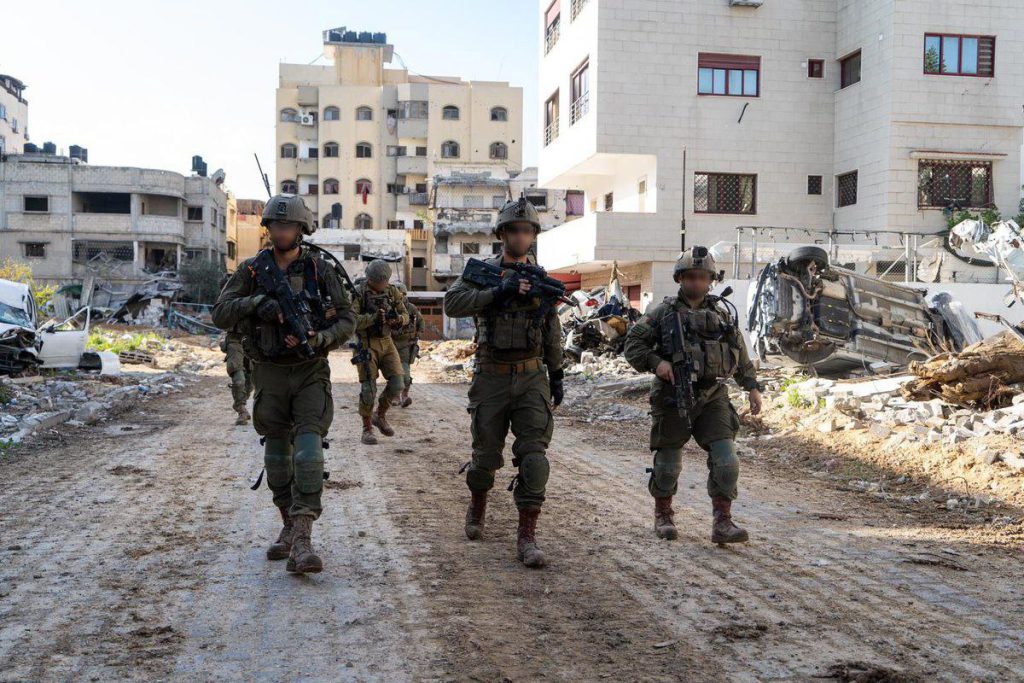
Domestic Arena
Israel’s attorney General, Gali Baharav Miara, has told the Israeli government that it would have to start drafting Haredi/Ultra-Orthodox men into the military on April 1st when the law exempting them expires on March 31st. The issue of drafting ultra-orthodox men has been a hot potato issue in Israeli politics for decades, as successive Israeli governments have failed in solving the issue and have generally opted to deal with it to a later date.
After successive requests from the Supreme court to postpone the deadline for submitting legislation that would be in compliance with Israeli Basic Laws, the court refused to extend the deadline after multiple attempts to allow the government to solve the issue failed, and issued an interim order to halt funds to Yeshivas (Haredi/Ultra-Orthodox religious Academies) whose students are eligible for the draft.
This issue poses a threat to the stability of the government as War Cabinet Ministers Benny Gantz and Gallant have already expressed their opposition to any legislation that would allow for a blanket exemption of Ultra-Orthodox. Fissures in Netanyahu’s government are widening, as inner-coalition fighting has the potential to bring down the government. Minister Gideon Saar, a Netanyahu opponent and former political ally of Benny Gantz, announced his resignation from the government as well as his party from the coalition. Saar’s resignation, who is to the right of Gantz, could put more pressure on Gantz to pull out of the government.
Meanwhile, opponents of the current government as well as some of the hostages’ families are increasing the pressure on the government by organizing a larger campaign for early elections. On Saturday night, large protests broke out near Netanyahu’s residence in Jerusalem and along major thoroughfares in Tel Aviv that included attempts to block major roads. Police arrested several protestors and used water cannons to disperse protestors on major highways.
According to some polls, most Israelis want early elections which could topple the current government and interfere with the war effort, however most Israelis remain committed to destroying Hamas and the return of the hostages regardless of who leads the government.
In this period, having a general election could seriously jeopardize the war effort. Israel is still deeply immersed in the Gaza war and is bracing for a possibility of a war in the northern front. Such a distraction could drag Israel into at least 6 months of domestic cleavage, sending a dangerous message to Hezbollah and Iran, much like political instability sent the wrong message to Hamas prior to October 7.
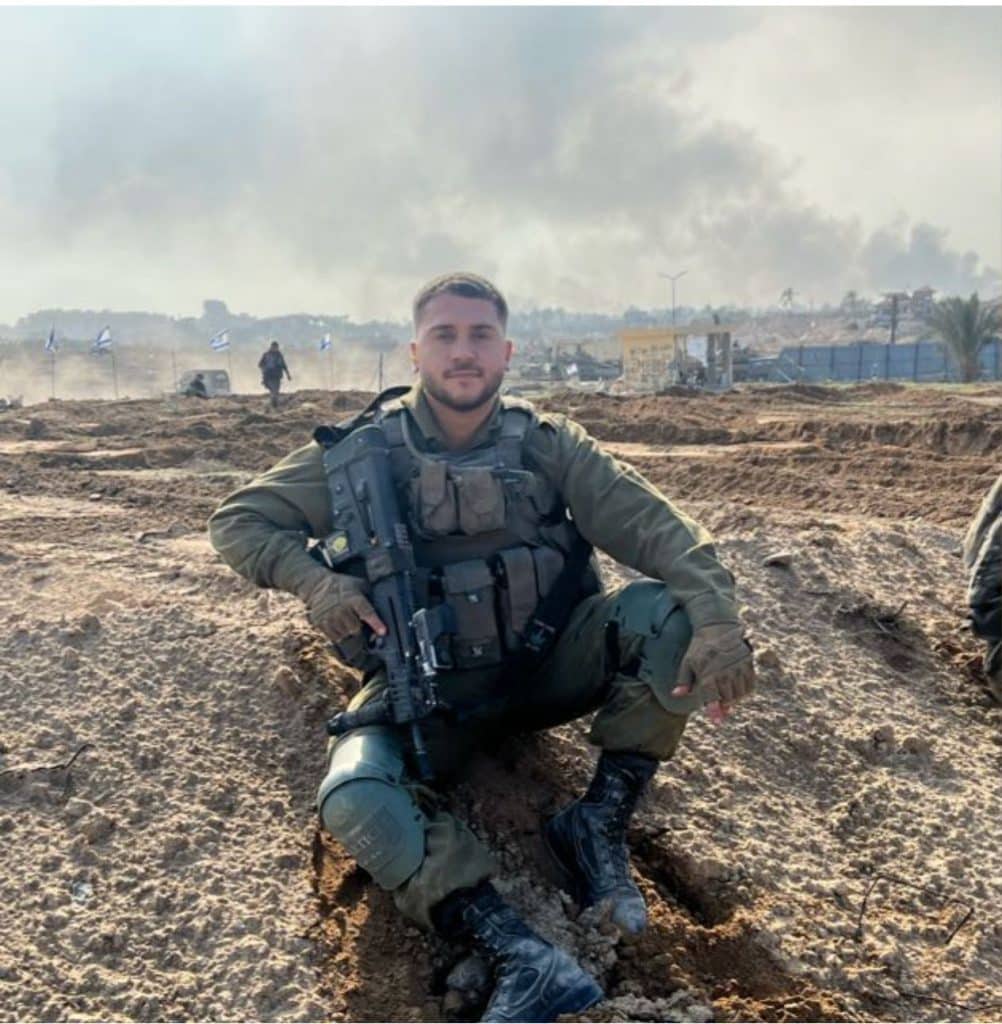
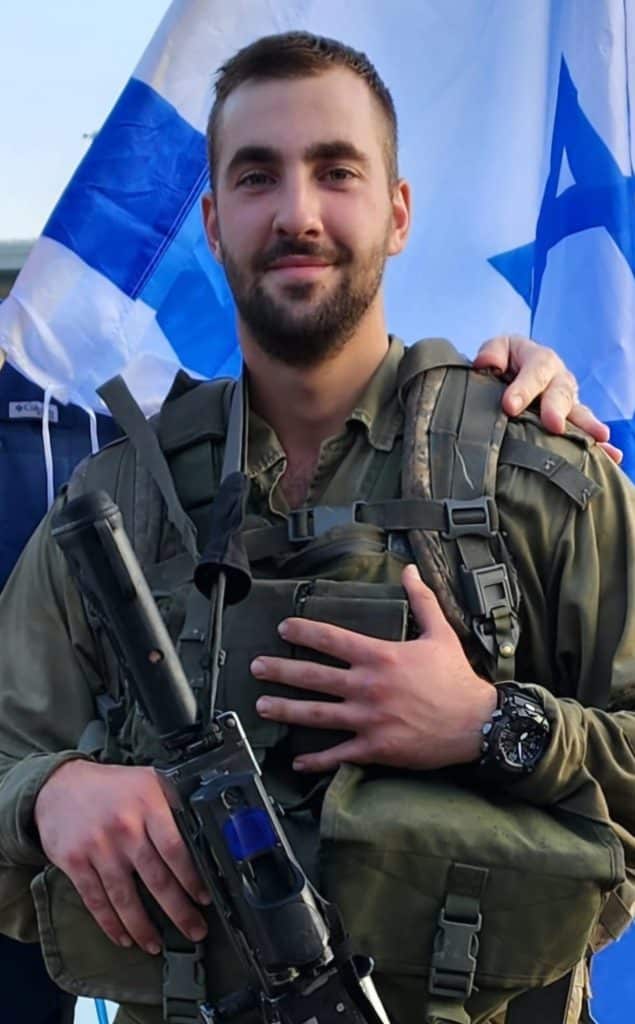
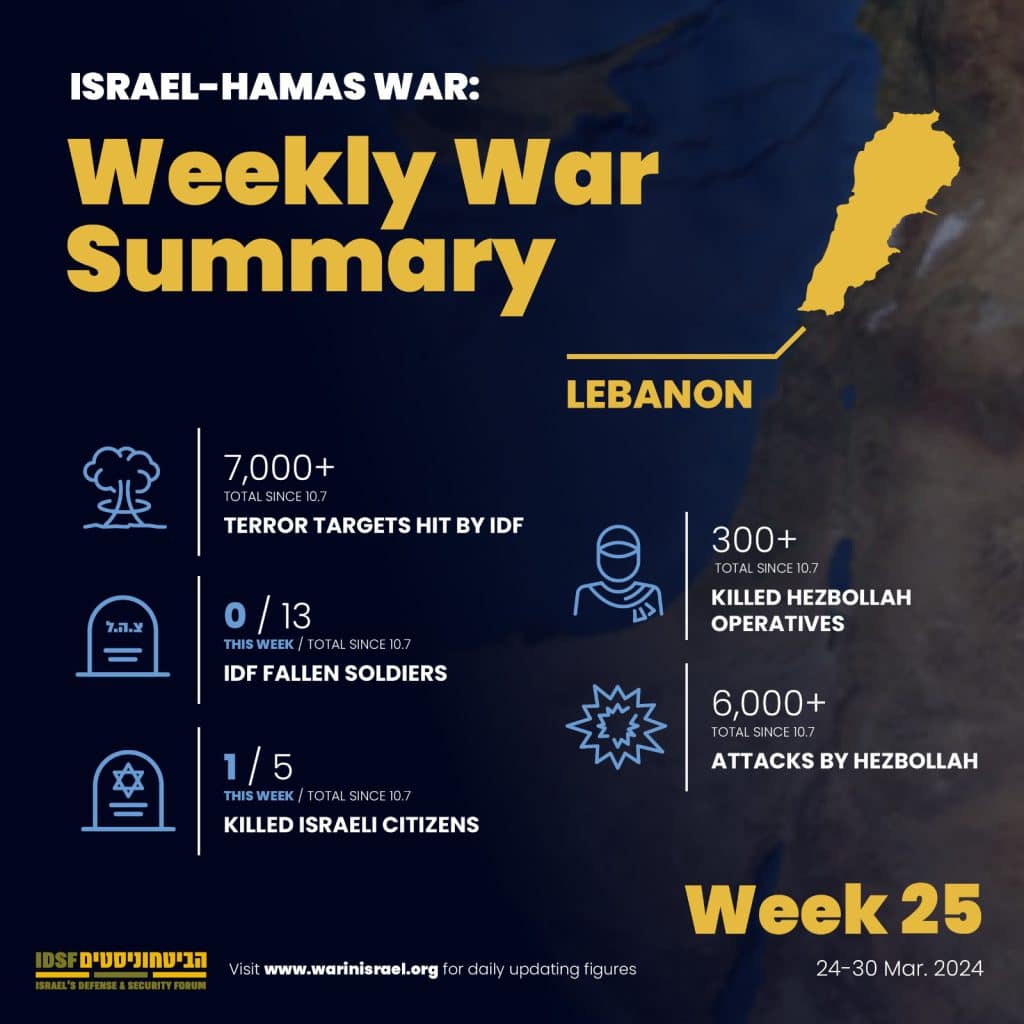
Lebanon
Operational
- The IDF eliminated the deputy commander of the rocket division in Hezbollah’s forces in Southern Lebanon.
- Three U.N. military observers and a Lebanese translator were injured in an explosion as they were patrolling the border with Israel. The IDF spokesperson said the IDF did not engage in the area that the incident occurred. Najib Mikati, the Lebanese caretaker prime minister, condemned the “grave incident” in a brief statement. He said he had received assurances from UNIFIL that the matter would be properly investigated. The incident happened in Rmaych in southern Lebanon. Residents and eyewitnesses testify that a Hezbollah rocket hit the UNIFIL forces.
- There were reports of attacks by the Israeli Air Force in the Hermel district in northern Lebanon, approximately 135 kilometers from the border with Israel, the northernmost point that the IDF has attacked so far in Lebanon.
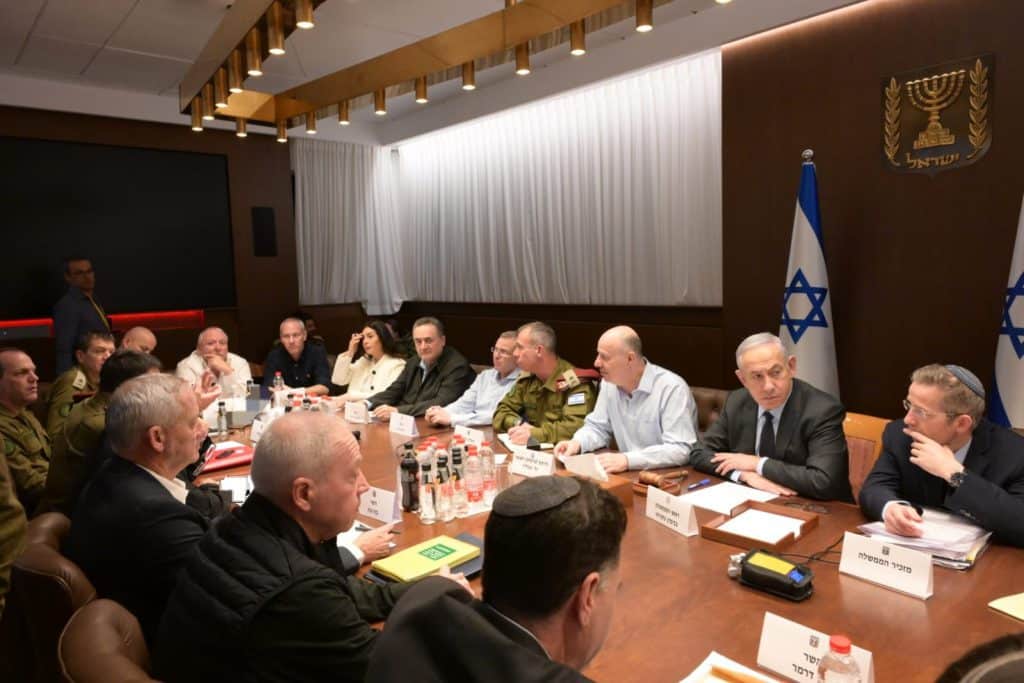
Diplomatic
The domestic pressure on Hezbollah is mounting. A series of meetings between the Christian sects in Lebanon decided not to allow Hezbollah to operate from their villages. Notably, Rmaych residents saw that Hezbollah is mounting rocket launchers in the village. Afraid of Israeli retaliation, the residents started a nation-wide campaign encouraging Christian sects to oppose Hezbollah and demand that they remove the rocket launchers and oppose their actions that could embroil Lebanon in a war with Israel.
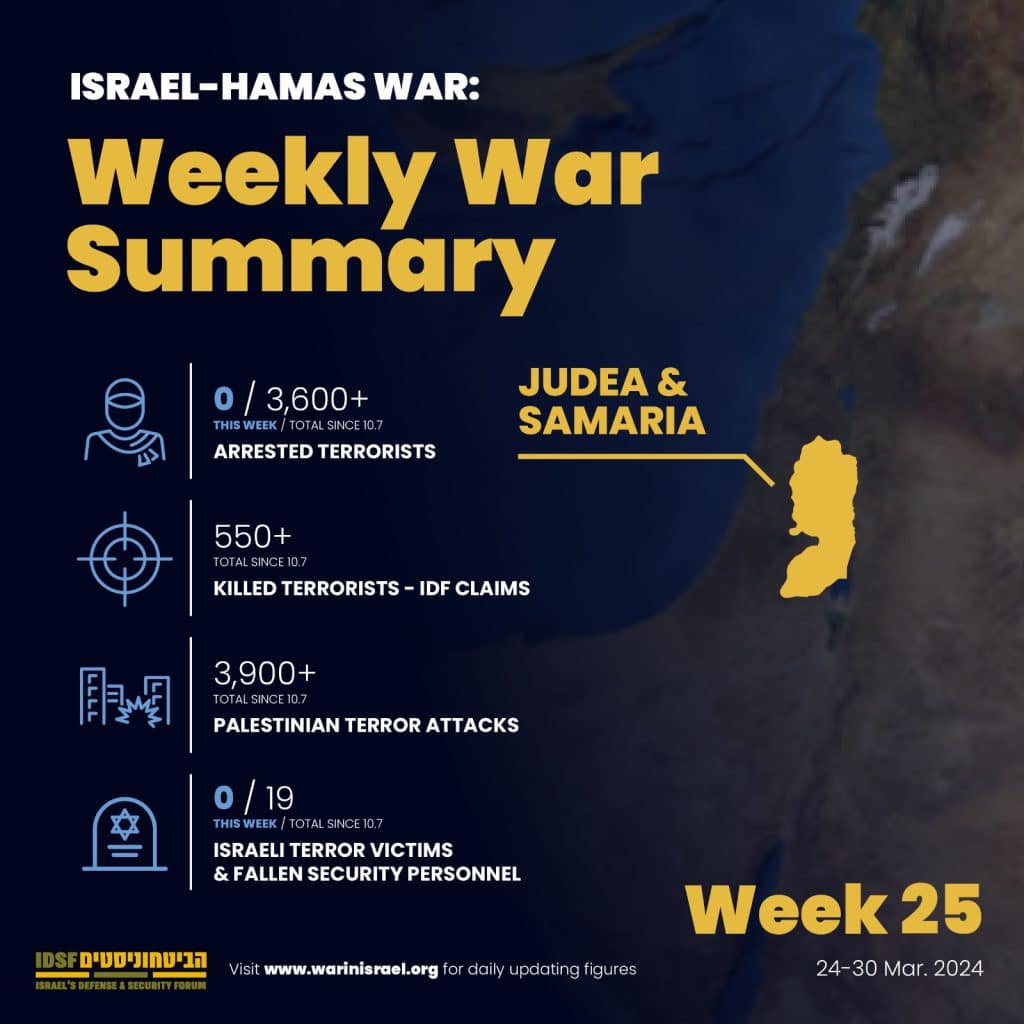
Judea and Samaria
- Ramadan has been relatively quite so far with no major incidents around the Temple Mount and the Al Aqsa Mosque despite persistent Hamas attempts to incite terrorist attacks.
- The Shin Bet and the IDF thwarted the smuggling of advanced weaponry originating from Iran that was destined for the territories of Judea and Samaria. It has been disclosed that in recent months, Iranian security elements have been working to smuggle military equipment, including advanced weapons originating from Iran, to the territories of Judea and Samaria, with the intention of carrying out terrorist acts against Israeli targets. According to reports, the Iranian security elements responsible for this are Unit 4000, the Special Operations Division of the Intelligence Organization of the Revolutionary Guards, headed by Javad Ghafari, and the Special Operations Unit in the Quds Force on Syrian territory (18840), which is under the sponsorship of the head of Unit 840, Azhar Bakri.
- Palestinian Authority President, Mahmoud Abbas met with German Foreign Minister, Annalena Baerbock, to discuss recent developments in the Gaza Strip and in Judea and Samaria. Abbas encouraged her to implement UN Security Council Resolution calling for an immediate cease-fire, and requested increased humanitarian aid throughout Gaza.
- New Palestinian Prime Minister, Mohammad Mustafa, has formed a new cabinet in which he will also serve as the Foreign Minister. According to the Palestinian news agency, WAFA, an immediate ceasefire and the withdrawal of the IDF from Gaza will be at the top of Mustafa’s priorities. The new cabinet will include eight ministers from Gaza, as well as a royal minister for aid affairs. Mustafa stated in an announcement that the first national priority is an immediate ceasefire in Gaza and a complete Israeli withdrawal, in addition to allowing humanitarian aid to enter in large quantities and reach all areas. Matthew Miller, spokesperson for the U.S. State Department, said that the United States welcomes the formation of the new Palestinian Authority government.
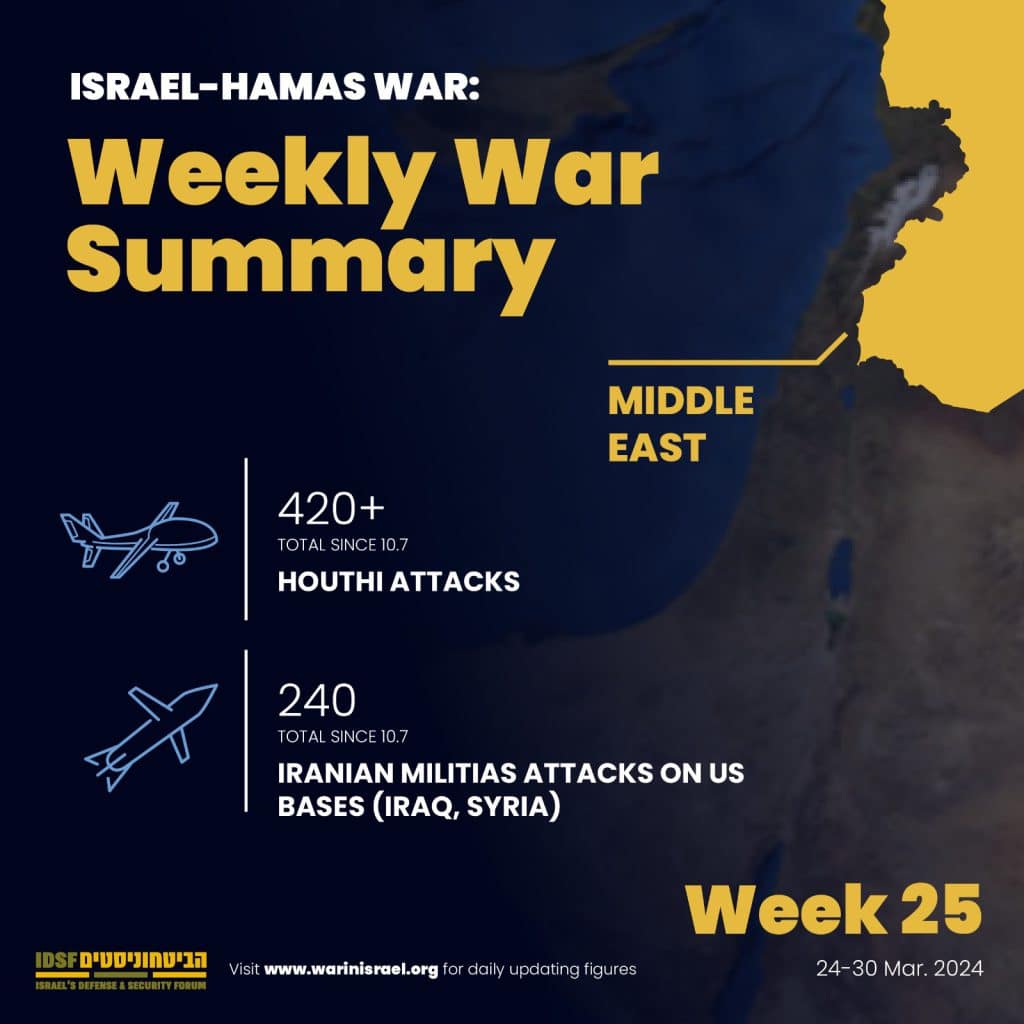
Iraq and Syria
Seemingly, Israel stepped up its campaign (war between wars) against the encroachment of Iranian proxies in Syria. According to reports, Israel carried out airstrikes in Aleppo in Northen Syria, a significant an expansion of the northern battlefield and a clear indication that Israel will not be restrained in attacking sites deemed as threats to Israel’s national security. The target of the attack was a weapon silo used by Hezbollah, IRGC and members of other Iranian proxies. According to reports there were over 50 casualties in this single attack.
Iran
Ismail Haniyeh, the head of Hamas’ political bureau met in Tehran with senior Iranian leadership including military chief of staff, Mohammad Bagheri, Foreign Minister, Hossein Amir Abdollahian, President Ebrahim Raisi and Supreme Leader Ayatollah Ali Khamenei in Tehran. Head of the PIJ terrorist organization funded entirely by Iran, Ziyad al-Nakhalah, also came to Teheran to meet with his group’s sponsors.
After his meeting with Iranian Foreign Minister Hossein Amir Abdollahian, Haniyeh stated, “The occupation has not managed to achieve its political and military objectives through its aggression against the Gaza Strip,” and that “it has begun to lose its political backing.” Haniyeh added, “We are undergoing a historic phase and a decisive turning point in the context of the historical conflict with the Zionist entity at the Battle of Al-Aqsa,” noting that the battle has entered its sixth month and the Palestinian people and the resistance are resilient in the face of annihilation, collectivism, and ethnic cleansing.
During his speech, he emphasized that “Washington has become incapable of imposing its will on the international community, as the occupation loses its support, and that the Security Council’s ceasefire decision, despite its delays and gaps, indicates that the occupation has begun to live in unprecedented political isolation.”
This is another testament to the fact that terrorist organization such as Hamas respond more militantly and aggressively when Israel is pressured and isolated diplomatically, as this is part of their battleplan. When the international community weakens Israel diplomatically by pressuring it into risky concessions to its national security, this only expands and lengthens the war, adds fuel to Hamas’s fire, and ultimately undermines the interests of Israel as well as those of the free world.
